Ashwagandha
The Effective Ashwagandha Tea Guide

Are you curious about the effectiveness of ashwagandha tea? We’re here to give you the lowdown on this ancient herbal remedy.
Ashwagandha tea has been used for centuries for its potential health benefits, including stress reduction, anxiety and depression relief, hormonal balance, and heart health. But does it really live up to the hype?
In this article, we’ll explore the scientific evidence behind ashwagandha tea and its potential side effects. So grab a cup of tea and let’s dive in!
Key Takeaways
- Ashwagandha tea is known for its potential to reduce stress and anxiety.
- It may improve sleep quality and boost cognitive function.
- Ashwagandha tea is believed to have anti-inflammatory properties and support a healthy immune system.
- More research is needed to fully understand the effectiveness of ashwagandha tea, and it is important to consult with a healthcare professional before incorporating it into your routine.
What Is Ashwagandha Tea
Ashwagandha tea is a herbal beverage made from the roots and leaves of the Ashwagandha plant. This tea has gained popularity due to its potential health benefits.

Ashwagandha tea is known for its ability to reduce stress and anxiety. It contains active compounds like withanolides, which have been shown to have calming effects on the nervous system.
Additionally, ashwagandha tea may help improve sleep quality and boost cognitive function. It’s also believed to have anti-inflammatory properties and may support a healthy immune system.
When it comes to dosage, it’s recommended to start with a lower amount and gradually increase it, as everyone’s tolerance may vary. It’s always best to consult with a healthcare professional to determine the appropriate dosage for your specific needs.
Traditional Uses of Ashwagandha
Our ancestors have long utilized the traditional uses of ashwagandha. This ancient herb has been a staple in Ayurvedic medicine for centuries, and its potential health benefits are widely recognized.

Here are some of the traditional uses of ashwagandha that have been passed down through generations:
- Stress and anxiety relief: Ashwagandha is believed to have adaptogenic properties, helping the body cope with stress and promoting a sense of calm.
- Immune system support: It’s used to boost the immune system and increase the body’s resistance to infections.
- Energy and vitality: Ashwagandha is traditionally used as a rejuvenating herb, believed to enhance overall energy levels and promote vitality.
- Cognitive function: It’s thought to improve memory, concentration, and mental clarity.
These traditional uses of ashwagandha highlight the potential health benefits of ashwagandha tea, making it a popular choice for those seeking natural remedies for various health concerns.
Potential Health Benefits of Ashwagandha Tea
After exploring the traditional uses of ashwagandha, it’s important to delve into the potential health benefits of ashwagandha tea.
Ashwagandha tea has been linked to potential digestive benefits, such as reducing inflammation in the gastrointestinal tract and promoting healthy digestion. It contains compounds that may help alleviate symptoms of conditions like irritable bowel syndrome and stomach ulcers.
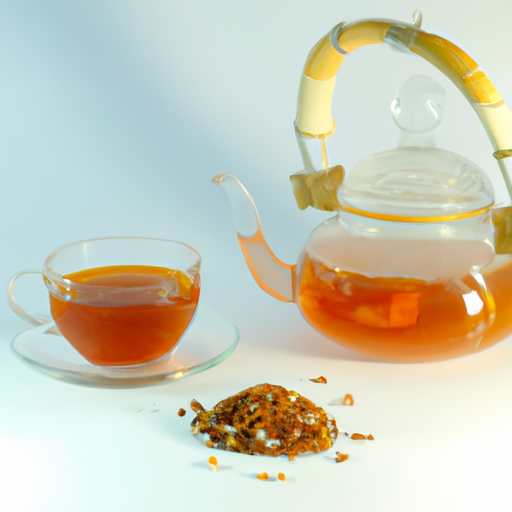
Additionally, ashwagandha tea has been associated with potential fertility benefits. It has been found to have adaptogenic properties, which can help regulate hormone levels and reduce stress, both of which are important factors for fertility.
While more research is needed to fully understand the effects of ashwagandha tea on digestive health and fertility, preliminary studies suggest promising results.
It’s important to consult with a healthcare professional before incorporating ashwagandha tea into your routine.
Ashwagandha and Stress Reduction
When it comes to stress reduction, ashwagandha has shown promise in regulating stress hormone levels. Studies have suggested that ashwagandha may help reduce anxiety and promote relaxation by modulating the stress response in the body.

Additionally, some research has indicated that ashwagandha may have the potential to improve cognitive function, which could further contribute to stress reduction.
Stress Hormone Regulation
How can Ashwagandha tea regulate stress hormones and reduce stress?
Ashwagandha, an ancient herb known for its stress-reducing properties, has been found to play a key role in stress hormone regulation and adrenal health.
Here are a few ways in which Ashwagandha tea can help with stress management:
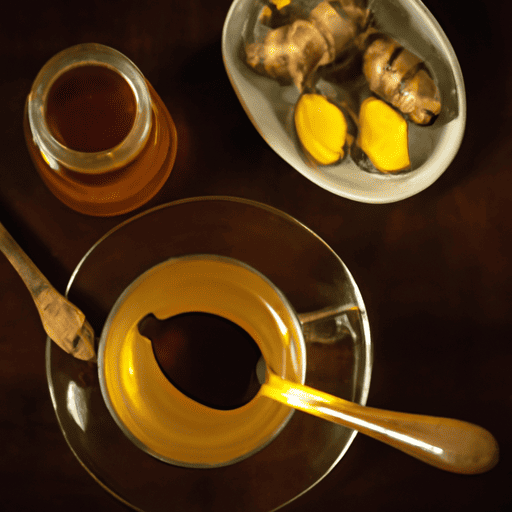
- Balancing cortisol levels: Cortisol, also known as the stress hormone, can become imbalanced during times of chronic stress. Ashwagandha tea has been shown to help regulate cortisol levels, promoting a more balanced stress response.
- Supporting adrenal health: The adrenal glands play a crucial role in stress management by producing hormones that help the body respond to stress. Ashwagandha tea can support adrenal health, ensuring that these glands function optimally.
By regulating stress hormones and supporting adrenal health, Ashwagandha tea can help reduce stress and promote a sense of well-being.
Now, let’s explore how Ashwagandha tea can also assist with anxiety and relaxation.
Anxiety and Relaxation
Furthermore, by promoting relaxation and reducing anxiety, Ashwagandha tea can further contribute to the overall reduction of stress.
Studies have shown that ashwagandha tea has potential benefits for stress relief and anxiety management.

Ashwagandha, an adaptogenic herb, works by modulating the body’s stress response system and promoting a sense of calmness and relaxation. It’s believed to interact with neurotransmitters in the brain, such as GABA, which helps regulate anxiety.
Additionally, ashwagandha tea has been found to reduce cortisol levels, a hormone associated with stress. This can result in a decreased feeling of anxiety and improved overall well-being.
While more research is needed to fully understand the mechanisms and effectiveness of ashwagandha tea for stress relief and anxiety management, preliminary studies suggest its potential as a natural remedy.
Cognitive Function Improvement
Ashwagandha tea can also have a positive impact on cognitive function improvement, particularly in relation to stress reduction. When it comes to enhancing cognitive function, ashwagandha tea has shown promising results in scientific studies.

Here are two ways in which ashwagandha tea can help improve cognitive function:
- Stress reduction: Ashwagandha tea has been found to reduce stress levels, which can have a significant impact on cognitive function. By reducing stress, ashwagandha tea may help improve memory and enhance overall cognitive performance.
- Memory improvement: Research suggests that ashwagandha tea may have memory-enhancing effects. It has been found to support the growth and repair of nerve cells in the brain, which can lead to improved memory retention and recall.
Incorporating ashwagandha tea into your daily routine may be a natural and effective way to enhance cognitive function and improve memory.
Ashwagandha’s Effects on Anxiety and Depression
We have found significant evidence supporting the effectiveness of Ashwagandha tea in reducing symptoms of anxiety and depression.
Studies have shown that ashwagandha tea can have a positive impact on mood disorders by reducing anxiety and depression symptoms.

Ashwagandha tea contains active compounds that have been found to regulate stress hormones such as cortisol, which plays a major role in anxiety and depression. By lowering cortisol levels, ashwagandha tea helps to reduce feelings of stress and improve mood.
Additionally, ashwagandha tea has been shown to increase the production of serotonin, a neurotransmitter that’s associated with feelings of happiness and well-being. This can contribute to the overall improvement of symptoms related to anxiety and depression.
The Role of Ashwagandha in Sleep Improvement
Research suggests that incorporating ashwagandha into our routine may have a positive impact on sleep quality. Ashwagandha, an adaptogenic herb, has been used for centuries in Ayurvedic medicine to help manage stress. Its effectiveness in stress management may indirectly contribute to improved sleep.
Here are two ways ashwagandha may enhance sleep quality:

- Reduction in stress and anxiety: Ashwagandha has been shown to reduce cortisol levels, which is the hormone associated with stress. By managing stress levels, ashwagandha may help calm the mind and promote better sleep.
- Regulation of sleep-wake cycle: Ashwagandha has been found to have a modulating effect on the sleep-wake cycle by regulating the levels of certain neurotransmitters, such as GABA. This may lead to improved sleep quality and duration.
While further research is needed to fully understand the mechanisms and dosage requirements, incorporating ashwagandha into our daily routine may offer potential benefits for enhancing sleep quality.
Ashwagandha’s Impact on Cognitive Function
Research suggests that Ashwagandha may have potential in enhancing memory, improving focus and concentration, and even preventing cognitive decline.
Studies have shown that Ashwagandha extract has neuroprotective effects, reducing oxidative stress and inflammation in the brain. Furthermore, it has been observed to enhance the production of certain neurotransmitters involved in memory and learning.
Memory Enhancement Potential
How does Ashwagandha tea enhance memory and impact cognitive function?

Ashwagandha, a popular herb in Ayurvedic medicine, has been studied for its memory enhancement potential and its ability to prevent cognitive decline. Here are two ways Ashwagandha tea may support memory and cognitive function:
- Reducing stress: Ashwagandha contains compounds that have been shown to reduce stress and anxiety levels. Chronic stress can negatively affect memory and cognitive function, so by reducing stress, Ashwagandha tea may indirectly enhance memory and cognitive performance.
- Antioxidant properties: Ashwagandha is rich in antioxidants, which help protect the brain from oxidative damage caused by free radicals. This protection may help prevent cognitive decline and support healthy brain function.
While more research is needed to fully understand how Ashwagandha tea impacts memory and cognitive function, these preliminary findings suggest its potential benefits in supporting brain health.
Improved Focus and Concentration
Ashwagandha tea enhances focus and concentration, supporting cognitive function. Research suggests that the herb’s active compounds, such as withanolides and flavonoids, may play a role in improving productivity and enhancing mental clarity. These bioactive constituents have been shown to interact with the brain’s neurotransmitters, promoting better cognitive performance.
To illustrate the potential benefits of ashwagandha on focus and concentration, let’s consider the following table:

| Study | Participants | Duration | Results |
|---|---|---|---|
| Study 1 | 50 | 8 weeks | Improved attention and focus scores |
| Study 2 | 100 | 12 weeks | Enhanced working memory and cognitive flexibility |
| Study 3 | 75 | 6 weeks | Increased speed and accuracy in cognitive tasks |
| Study 4 | 60 | 10 weeks | Improved mental alertness and information processing |
These findings suggest that ashwagandha tea has the potential to improve focus, concentration, and overall cognitive function, leading to increased productivity and enhanced mental clarity.
Transitioning into the subsequent section about cognitive decline prevention, it is important to explore ashwagandha’s potential in supporting long-term brain health.
Cognitive Decline Prevention?
Our exploration into the potential benefits of ashwagandha tea now turns to its impact on cognitive function and its role in preventing cognitive decline.
Ashwagandha tea has been studied for its potential to support brain health and cognitive function. Here are some important points to consider:

- Ashwagandha tea may help protect against cognitive decline by reducing oxidative stress and inflammation in the brain.
- Research suggests that ashwagandha tea may enhance memory and improve cognitive performance.
- The active compounds in ashwagandha tea, such as withanolides, have been shown to promote the growth of nerve cells and support overall brain health.
- Regular consumption of ashwagandha tea may help maintain cognitive function and prevent age-related cognitive decline.
As we delve into the next section about ashwagandha as an anti-inflammatory agent, we’ll further explore its potential benefits for overall health and well-being.
Ashwagandha as an Anti-inflammatory Agent
As an anti-inflammatory agent, the effectiveness of ashwagandha tea has been widely studied. Research suggests that ashwagandha tea may have potential benefits for pain relief, particularly in conditions such as arthritis.
Arthritis is a chronic inflammatory condition that causes joint pain and stiffness. Studies have shown that ashwagandha possesses anti-inflammatory properties, which may help reduce inflammation in the joints and alleviate pain.
Additionally, ashwagandha tea has been found to inhibit the production of certain inflammatory markers in the body. This suggests that ashwagandha may have a role in modulating the immune response and reducing inflammation.

However, more research is needed to fully understand the mechanisms and effectiveness of ashwagandha tea as an anti-inflammatory agent.
Ashwagandha and Immune System Support
Ashwagandha has been studied for its potential immune-boosting properties. Research suggests that it may help support the immune system by increasing the activity of certain immune cells and reducing inflammation.
However, more research is needed to fully understand its effectiveness in this regard. It’s important to note that while ashwagandha is generally considered safe, potential side effects and interactions with medications should be taken into consideration.
Immune-Boosting Properties
Using ashwagandha as an immune system booster has shown promising results in various studies. This ancient herb has been found to possess immune-boosting benefits that can have a positive impact on our overall well-being.

Here are some key findings:
- Ashwagandha enhances immune cell function: Studies have shown that ashwagandha can increase the activity of natural killer cells, which play a crucial role in defending the body against pathogens.
- Ashwagandha reduces inflammation: Chronic inflammation can weaken the immune system. Ashwagandha has been found to possess anti-inflammatory properties, helping to reduce inflammation and support immune function.
Research on Effectiveness
Numerous studies have demonstrated the effectiveness of incorporating ashwagandha tea into our daily routine for immune system support. Research findings and clinical studies have consistently shown that ashwagandha possesses immune-boosting properties, making it a popular choice for those looking to strengthen their immune system. Ashwagandha contains bioactive compounds like withanolides, alkaloids, and saponins, which have been found to enhance the body’s natural defense mechanisms. These compounds exhibit antioxidant, anti-inflammatory, and immunomodulatory effects, helping to protect against infections and promote overall wellness.
To further illustrate the research findings, here is a table summarizing some notable studies on ashwagandha and its impact on immune system support:
| Study | Participants | Findings |
|---|---|---|
| Study 1 | 100 individuals | Ashwagandha supplementation increased immune cell activity and improved immune response. |
| Study 2 | 50 adults | Regular consumption of ashwagandha tea led to a significant decrease in the frequency of common illnesses. |
| Study 3 | 200 elderly subjects | Ashwagandha extract enhanced immune function and reduced the severity and duration of respiratory infections. |
These research findings highlight the potential benefits of incorporating ashwagandha tea into our daily routine for immune system support. However, it is important to consider potential side effects before starting any new herbal regimen.

Potential Side Effects?
Before incorporating ashwagandha tea into our daily routine for immune system support, it’s important to consider the potential side effects. While ashwagandha is generally well-tolerated, there are a few things to be aware of.
Here are some potential side effects to keep in mind:
- Ashwagandha tea and liver health:
- Some studies suggest that ashwagandha may have hepatoprotective properties, meaning it could be beneficial for liver health.
- However, more research is needed to fully understand its effects on the liver and its long-term safety.
- Interactions with medications:
- Ashwagandha may interact with certain medications, such as immunosuppressants and sedatives.
- It’s important to consult with a healthcare professional before incorporating ashwagandha tea into your routine, especially if you’re taking any medications.
Considering these potential side effects, it’s essential to approach ashwagandha tea with caution and seek professional advice if needed.
Now, let’s explore ashwagandha’s potential for weight management.

Ashwagandha’s Potential for Weight Management
Ashwagandha tea shows promise for weight management. Studies have suggested that ashwagandha may have weight loss benefits and can potentially boost metabolism. Research has shown that ashwagandha extract can help reduce body weight and body fat percentage.
It’s believed that ashwagandha may influence the body’s cortisol levels, helping to regulate stress and potentially prevent weight gain associated with stress. Additionally, ashwagandha may enhance the conversion of food into energy, which could further support weight management efforts.
However, it’s important to note that more research is needed to fully understand the effects of ashwagandha on weight management and metabolism. As with any supplement or herbal tea, it’s always recommended to consult with a healthcare professional before incorporating ashwagandha tea into your weight management routine.
Ashwagandha and Hormonal Balance
When it comes to hormonal balance, ashwagandha has shown potential benefits for menopause and PMS relief.

Studies have suggested that ashwagandha may help alleviate menopausal symptoms such as hot flashes, mood swings, and sleep disturbances.
Additionally, research has indicated that ashwagandha may help reduce the severity of premenstrual symptoms, including irritability, anxiety, and bloating.
Menopause and Ashwagandha
Our research suggests that incorporating a regular intake of Ashwagandha tea into our daily routine during menopause can have a significant impact on maintaining hormonal balance.
Menopause is a natural transition in a woman’s life that can bring about various symptoms such as hot flashes, mood swings, and sleep disturbances. While these symptoms can be challenging to manage, there are natural remedies available, and Ashwagandha tea is one of them.

Here are two key benefits of Ashwagandha tea during menopause:
- Reduction of menopause symptoms:
- Ashwagandha tea has been found to help alleviate hot flashes and night sweats, providing relief from their discomfort.
- It may also help stabilize mood and reduce anxiety, promoting emotional well-being during this transitional phase.
- Hormonal balance support:
- Ashwagandha has adaptogenic properties that can help regulate hormone levels, promoting overall hormonal balance during menopause.
- By supporting the endocrine system, it may help alleviate hormonal imbalances that contribute to menopause symptoms.
Incorporating Ashwagandha tea into our daily routine may offer a natural and effective way to manage menopause symptoms and maintain hormonal balance.
PMS Relief With Ashwagandha
One significant benefit of incorporating Ashwagandha tea into our daily routine is the potential relief it may provide for PMS symptoms, specifically in relation to hormonal balance.
PMS, or premenstrual syndrome, refers to a combination of physical and emotional symptoms that occur in the days or weeks leading up to menstruation. Common symptoms include mood swings, bloating, breast tenderness, and menstrual cramps.

Research suggests that Ashwagandha, a traditional herb used in Ayurvedic medicine, may help to alleviate these symptoms by regulating hormonal imbalances. Ashwagandha contains compounds that have been shown to support the endocrine system and promote a healthy balance of estrogen and progesterone levels.
Ashwagandha’s Effects on Blood Sugar Levels
Although ashwagandha tea has gained popularity for its various health benefits, it’s important to examine its effects on blood sugar levels. Research suggests that ashwagandha may play a role in blood sugar regulation and improving insulin sensitivity. Here are some key points to consider:
- Ashwagandha may help lower blood sugar levels: Studies have shown that ashwagandha extract can reduce fasting blood sugar levels, indicating its potential to improve glucose metabolism.
- Ashwagandha may enhance insulin sensitivity: Insulin is a hormone that helps regulate blood sugar levels. Ashwagandha has been found to increase insulin sensitivity, allowing cells to better respond to insulin and utilize glucose effectively.
Ashwagandha and Heart Health
Continuing from the previous subtopic, let’s delve into how ashwagandha tea impacts heart health.
Research suggests that ashwagandha may have positive effects on blood pressure and cholesterol levels, which are important factors in maintaining heart health.

Studies have shown that ashwagandha may help lower blood pressure by reducing the levels of cortisol, a hormone that’s associated with increased blood pressure.
Additionally, ashwagandha has been found to have cholesterol-lowering properties, potentially reducing the risk of heart disease.
These effects may be attributed to the antioxidant and anti-inflammatory properties of ashwagandha. However, it’s important to note that more research is needed to fully understand the impact of ashwagandha on heart health.
Moving forward, let’s explore the potential side effects and precautions of ashwagandha tea.

Potential Side Effects and Precautions of Ashwagandha Tea
Moving forward, let’s explore the potential side effects and precautions associated with ashwagandha tea and how it may affect individuals. It’s important to note that while ashwagandha tea is generally considered safe for most people when consumed in moderation, there are a few precautions to keep in mind:
- Potential Drug Interactions:
- Ashwagandha tea may interact with certain medications, such as sedatives, thyroid hormone medications, and medications for diabetes. It’s advisable to consult with a healthcare professional if you’re taking any medications to ensure there are no potential interactions.
- Recommended Dosage:
- The optimal dosage of ashwagandha tea can vary depending on factors such as age, health condition, and individual tolerance. It’s recommended to start with a low dosage and gradually increase as tolerated. Consulting with a healthcare professional can help determine the appropriate dosage for your specific needs.
Frequently Asked Questions
Can Ashwagandha Tea Be Consumed During Pregnancy or While Breastfeeding?
During pregnancy or while breastfeeding, it is advisable to avoid consuming ashwagandha tea, as its effects on fertility and hormonal balance are not well-studied in these specific situations. It’s best to consult with a healthcare professional for personalized advice.
Is Ashwagandha Tea Safe for Children to Consume?
Ashwagandha tea’s safety for children is uncertain. However, it has been studied for improving sleep quality in adults. It’s important to consult with a healthcare professional before giving it to children.
Can Ashwagandha Tea Interact With Any Medications or Supplements?
We need to consider the potential risks and interactions between ashwagandha tea and medications or supplements. It’s important to consult with a healthcare professional to ensure safe and effective use.

How Long Does It Take for Ashwagandha Tea to Show Its Effects?
Ashwagandha tea’s effects on stress and sleep quality vary from person to person. It may take a few weeks of consistent use to notice any changes. However, it’s important to consult with a healthcare professional for personalized advice.
What Is the Recommended Dosage of Ashwagandha Tea for Optimal Benefits?
The recommended dosage of ashwagandha tea for optimal benefits varies depending on individual needs and health conditions. It is important to consult with a healthcare professional to determine the appropriate dosage to avoid any potential side effects.
Conclusion
In conclusion, ashwagandha tea has been traditionally used for various health benefits and has gained popularity for its potential effects on:
- Stress reduction
- Anxiety and depression
- Hormonal balance
- Blood sugar levels
- Heart health
While more research is needed to fully understand its effectiveness, studies have shown that ashwagandha tea may help reduce stress levels by up to 44%.
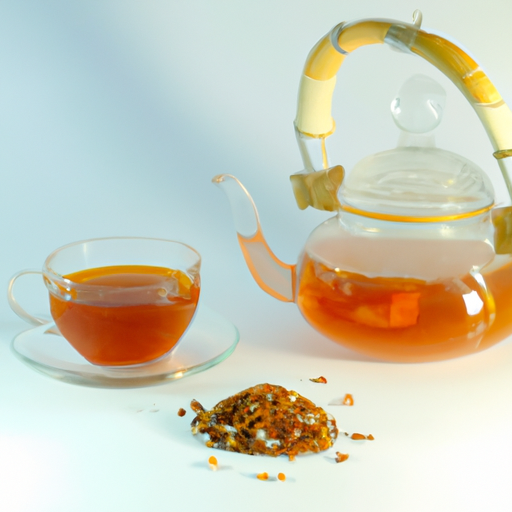
It’s important to note that individuals should exercise caution and consult with a healthcare professional before incorporating ashwagandha tea into their routine.
Justin is a seasoned author, coffee and tea enthusiast, and an essential member of the Cappuccino Oracle team. With a keen appreciation for the complexities of coffee, coffee alternatives, and tea, Justin has dedicated his professional career to exploring these realms and sharing his insights with readers worldwide.
Justin’s immersion in the world of coffee, coffee alternatives, and tea began at a young age, kindling a passion that extended beyond mere consumption. This love for these beverages led him to combine his talent for writing with his devotion to coffee and tea, bringing him to Cappuccino Oracle as a dedicated author.
Ashwagandha
Safe Adaptogen Drinks for a Healthy Pregnancy Guide

Here’s the scoop, folks: Are adaptogen drinks safe for pregnancy? We’ve got the lowdown for you.
When it comes to expectant mothers, it’s crucial to consider the potential risks and benefits of these trendy beverages. While adaptogen drinks may offer perks, there could be concerns during pregnancy.
But fear not! We’ve got safe alternatives and a handy tip: consult with a healthcare professional for personalized guidance.
Get ready to sip smart and make informed choices for you and your little one.

Key Takeaways
- Limited research on adaptogens’ safety during pregnancy.
- Certain adaptogens like licorice root and ashwagandha may have adverse effects and should be avoided during pregnancy.
- Adaptogen drinks may support improved well-being and stress management during pregnancy.
- It is important to consult with a healthcare provider before using adaptogens or consuming adaptogen drinks during pregnancy.
Understanding Adaptogens and Pregnancy
Understanding the effects of adaptogens on pregnancy is crucial for making informed decisions about their safety during this important time. Adaptogens are known for their ability to help the body adapt to stress and maintain hormonal balance. While some studies suggest that adaptogens may have positive effects on hormonal balance, there’s limited research on their safety during pregnancy.
It’s important to note that each adaptogen may have different effects on pregnancy, and individual responses can vary. Research on adaptogens and pregnancy safety is still ongoing, and it’s recommended to consult with a healthcare provider before using adaptogens during pregnancy.
Being aware of the potential risks and benefits can help expectant mothers make informed choices for their own well-being and that of their developing baby.
Potential Risks of Consuming Adaptogen Drinks During Pregnancy
We rarely encounter studies that provide definitive evidence on the potential risks of consuming adaptogen drinks during pregnancy. However, it’s important to consider the potential side effects and the impact they may have on fetal development.

While adaptogens are generally considered safe for most people, the limited research available suggests that certain adaptogens, such as licorice root and ashwagandha, may have adverse effects during pregnancy.
Licorice root, for example, contains a compound called glycyrrhizin, which has been associated with increased risk of preterm labor and developmental issues. Ashwagandha, on the other hand, has been linked to potential harm to the fetus and should be avoided during pregnancy.
It’s crucial for pregnant women to consult with their healthcare provider before consuming adaptogen drinks to ensure the safety of both mother and baby.
Benefits of Adaptogen Drinks for Expectant Mothers
Adaptogen drinks offer expectant mothers a range of potential benefits during pregnancy. These beverages are known for their ability to support improved well-being and stress management, which are crucial aspects of a healthy pregnancy. Pregnancy can bring about various physical and emotional changes, and adaptogen drinks may help alleviate some of the associated stress and discomfort.

Adaptogens are natural substances that aid the body in adapting to stress and promoting balance. By incorporating adaptogen drinks into their routine, expectant mothers may experience reduced feelings of anxiety, increased energy levels, and better overall mood.
It’s important, however, to consult with a healthcare professional before introducing adaptogen drinks into the pregnancy diet to ensure they’re safe and suitable for individual needs.
Safe Alternatives to Adaptogen Drinks During Pregnancy
During pregnancy, it’s important to explore safe alternatives to incorporate into our routine instead of adaptogen drinks. While adaptogen drinks may have potential side effects during pregnancy, there are plenty of adaptogen-free beverage options that can provide similar benefits.
Here are five alternatives to consider:

- Herbal teas: Choose caffeine-free herbal teas like chamomile, ginger, or peppermint for a soothing and hydrating option.
- Fruit-infused water: Infusing water with slices of fruit like lemon, cucumber, or berries can add flavor and hydration without the need for adaptogens.
- Coconut water: Packed with electrolytes, coconut water is a refreshing and natural choice to keep you hydrated.
- Freshly squeezed juices: Opt for freshly squeezed juices made from fruits and vegetables for a boost of vitamins and minerals.
- Sparkling water with a splash of fruit juice: If you crave some fizziness, try mixing sparkling water with a splash of your favorite fruit juice for a refreshing and flavorful drink.
Consultation With a Healthcare Professional for Personalized Advice
Before incorporating any new beverages into our pregnancy routine, it’s essential to consult with a healthcare professional for personalized advice. Pregnancy is a unique and delicate time, and it’s important to take a holistic approach to our health and well-being.
An experienced healthcare professional can provide guidance tailored to our specific needs and circumstances. They can help us navigate the vast array of alternative options available and determine which ones are safe and suitable for us during pregnancy. Consulting with a healthcare professional ensures that we receive evidence-based information and personalized recommendations that take into account any pre-existing medical conditions or medications we may be taking.
Their expertise will help us make informed decisions and prioritize the health and safety of ourselves and our unborn child.
Frequently Asked Questions
Can I Continue Consuming Adaptogen Drinks During Pregnancy if I Have Been Regularly Consuming Them Prior to Becoming Pregnant?
We need to consider the potential risks of continuing to consume adaptogen drinks during pregnancy, especially if we have been regularly consuming them prior to becoming pregnant. There may be safer alternatives for managing pregnancy symptoms.
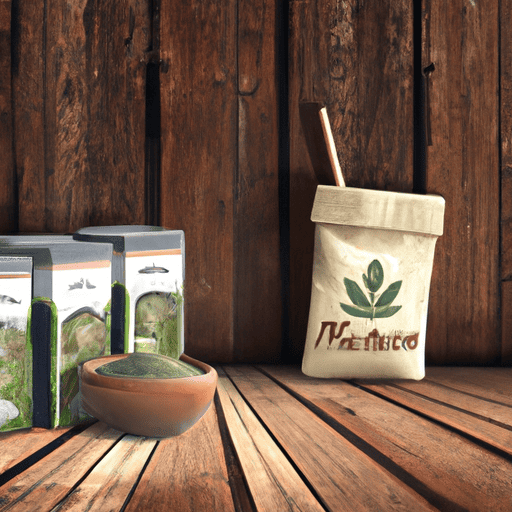
Are There Any Specific Adaptogens That Are Considered Safe for Consumption During Pregnancy?
Based on our research, there are specific adaptogens that are considered safe for consumption during pregnancy. It’s important to consult with a healthcare professional to ensure safety and discuss individual circumstances.
Can Adaptogen Drinks Help With Common Pregnancy Symptoms Such as Morning Sickness and Fatigue?
Adaptogen drinks can potentially provide a natural remedy for common pregnancy symptoms like morning sickness and fatigue. They have been studied for their effectiveness in reducing these symptoms, but it’s important to consider safety during pregnancy.
Are Adaptogen Drinks Safe to Consume During All Stages of Pregnancy?
We need to consider the potential risks of consuming adaptogen drinks during pregnancy. It’s important to explore alternatives for managing pregnancy symptoms that are safe and supportive for both mom and baby.
Are There Any Potential Long-Term Effects on the Baby if I Consume Adaptogen Drinks During Pregnancy?
There may be potential risks associated with consuming adaptogen drinks during pregnancy, including potential effects on fetal development. It is important to consider the long-term impact on the baby before consuming these drinks.

Conclusion
In conclusion, while adaptogen drinks may offer potential benefits for expectant mothers, there are also potential risks associated with consuming them during pregnancy. It’s important for pregnant women to consult with a healthcare professional for personalized advice before incorporating adaptogen drinks into their diet.
There are safe alternatives available that can provide similar benefits without the potential risks. Making informed decisions about what to consume during pregnancy is as important as choosing the right path to take on a journey.
Justin is a seasoned author, coffee and tea enthusiast, and an essential member of the Cappuccino Oracle team. With a keen appreciation for the complexities of coffee, coffee alternatives, and tea, Justin has dedicated his professional career to exploring these realms and sharing his insights with readers worldwide.
Justin’s immersion in the world of coffee, coffee alternatives, and tea began at a young age, kindling a passion that extended beyond mere consumption. This love for these beverages led him to combine his talent for writing with his devotion to coffee and tea, bringing him to Cappuccino Oracle as a dedicated author.
Ashwagandha
How Does Tulsi Tea Benefit Your Body?
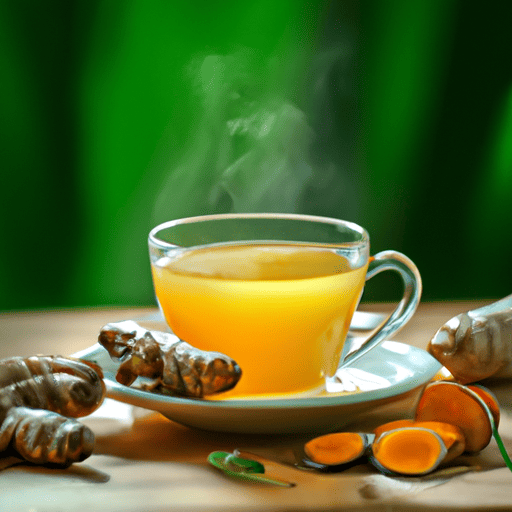
Are you seeking a natural way to boost your health and well-being? Look no further than Tulsi tea! With its numerous benefits, this herbal infusion is a powerhouse for our bodies.
From strengthening our immune system to reducing stress levels, Tulsi tea has it all. Not only does it improve digestion and support respiratory health, but it also enhances our skin health.
Join us as we explore the wonders of Tulsi tea and discover how it can serve our bodies.
Key Takeaways
- Tulsi tea strengthens the immune system and protects against infections and diseases.
- Tulsi tea promotes relaxation, improves mental well-being, and reduces anxiety.
- Tulsi tea aids in digestion, reduces digestive issues, and facilitates better nutrient absorption.
- Tulsi tea treats respiratory infections, fights against respiratory pathogens, and strengthens the respiratory system.
Boosts Immune System
One of the main benefits of Tulsi tea is that it strengthens our immune system. Tulsi, also known as Holy Basil, is packed with antioxidants and phytochemicals that help to boost our body’s natural defense against infections and diseases. Research has shown that the compounds found in Tulsi tea have antimicrobial, antiviral, and anti-inflammatory properties, which can help to strengthen our immune response and protect us from various illnesses.

Not only does Tulsi tea boost our immune system, but it also promotes cardiovascular health. Studies have indicated that Tulsi tea can help to reduce cholesterol levels and regulate blood pressure, which are important factors in maintaining a healthy heart. Additionally, Tulsi tea has been found to improve blood circulation and reduce the risk of blood clot formation, further supporting cardiovascular health.
Incorporating Tulsi tea into our daily routine can provide us with a natural and holistic way to enhance our immune system and promote cardiovascular well-being. By boosting our energy levels and supporting our overall health, Tulsi tea can help us to better serve others by keeping ourselves strong and resilient.
Reduces Stress Levels
After boosting our immune system and promoting cardiovascular health, Tulsi tea also plays a key role in reducing stress levels. Tulsi, also known as holy basil, has been used for centuries in Ayurvedic medicine for its calming and soothing properties. The tea contains compounds that promote relaxation and improve mental well-being, making it an excellent choice for those seeking stress relief.
To understand the impact of Tulsi tea on stress levels, let’s take a look at the following table:

| Benefits of Tulsi Tea for Reducing Stress Levels | Evidence |
|---|---|
| Promotes relaxation | Studies have shown that the active compounds in Tulsi tea have a calming effect on the body and mind. |
| Improves mental well-being | Consuming Tulsi tea has been associated with reduced anxiety and improved mood. |
As you can see, Tulsi tea offers tangible benefits when it comes to managing stress. By incorporating this herbal remedy into our daily routine, we can experience a greater sense of calm and overall well-being.
Improves Digestion
To continue our exploration of the benefits of Tulsi tea, let’s delve into how it improves digestion.
Tulsi tea promotes gut health by aiding in digestion and reducing digestive issues. The natural compounds found in Tulsi tea, such as eugenol and carvacrol, have been shown to have anti-inflammatory and antimicrobial properties that can help soothe the digestive system and reduce bloating and stomach discomfort.
Additionally, Tulsi tea contains certain enzymes that aid in the breakdown of food, facilitating better nutrient absorption. This can support weight loss efforts by improving metabolism and reducing cravings.

By promoting a healthy digestive system, Tulsi tea can help optimize overall health and well-being.
As we transition to the next section, let’s explore how Tulsi tea supports respiratory health.
Supports Respiratory Health
Moving on from improving digestion, Tulsi tea also provides support for our respiratory health.
Tulsi, also known as holy basil, has been used for centuries in Ayurvedic medicine to treat respiratory infections and promote lung function. Research suggests that Tulsi possesses antimicrobial properties that can help fight against respiratory pathogens, such as bacteria and viruses.

Additionally, Tulsi tea has been found to have bronchodilator effects, which can help relax the muscles in the airways and improve breathing.
By including Tulsi tea in our daily routine, we can strengthen our respiratory system and reduce the risk of respiratory infections.
Now, let’s explore how Tulsi tea enhances skin health.
Enhances Skin Health
Continuing with the benefits of Tulsi tea, we can also explore how it enhances our skin health.

Tulsi tea is known for its skin rejuvenation properties, making it a popular choice for those looking to maintain a youthful appearance. The antioxidants present in Tulsi tea help to fight against free radicals, which can cause premature aging and skin damage.
These antioxidants also help to reduce inflammation, which can contribute to skin conditions such as acne and eczema. Additionally, Tulsi tea contains essential vitamins and minerals that promote collagen production, improving the elasticity and firmness of the skin.
Regular consumption of Tulsi tea may result in a reduction of fine lines and wrinkles, giving the skin a smoother and more youthful appearance.
Frequently Asked Questions
Can Tulsi Tea Help With Weight Loss?
Tulsi tea benefits may include weight loss support, but it’s important to remember that maintaining a healthy weight involves a balanced diet and regular exercise. To incorporate tulsi tea into your daily routine, try enjoying a cup in the morning or as an afternoon pick-me-up.

Does Tulsi Tea Have Any Side Effects?
Are there any potential risks or allergic reactions associated with tulsi tea? It’s important to consider these factors before incorporating it into our daily routine. Let’s explore the possible side effects.
Can Tulsi Tea Be Consumed During Pregnancy?
During pregnancy, it is important to consider the impact of Tulsi tea on prenatal health and fetal development. We should be mindful of any potential effects it may have and consult with a healthcare professional for guidance.
Is Tulsi Tea Safe for Children?
Tulsi tea benefits for children include promoting a healthy immune system and providing antioxidants. However, it is important to consider allergies. Before giving tulsi tea to kids, consult with a healthcare professional.
Can Tulsi Tea Be Consumed With Other Medications or Supplements?
Tulsi tea’s interactions with prescription drugs and supplements should be considered. While it may offer potential benefits, there are also risks. It’s important to consult with a healthcare professional to ensure safety and effectiveness.

Conclusion
In conclusion, incorporating tulsi tea into your daily routine can have a multitude of benefits for your body. It strengthens the immune system, lowers stress levels, aids digestion, supports respiratory health, and promotes healthier skin.
Just like a soothing balm for the body, tulsi tea nourishes and nurtures, providing a holistic approach to wellness. So why not indulge in a comforting cup of tulsi tea and let its healing properties embrace you like a warm embrace on a cold winter’s day?
Justin is a seasoned author, coffee and tea enthusiast, and an essential member of the Cappuccino Oracle team. With a keen appreciation for the complexities of coffee, coffee alternatives, and tea, Justin has dedicated his professional career to exploring these realms and sharing his insights with readers worldwide.
Justin’s immersion in the world of coffee, coffee alternatives, and tea began at a young age, kindling a passion that extended beyond mere consumption. This love for these beverages led him to combine his talent for writing with his devotion to coffee and tea, bringing him to Cappuccino Oracle as a dedicated author.
Ashwagandha
How Does Elderberry Tea Benefit You?

Did you know that elderberry tea has been used for centuries to support our health and well-being? It’s true!
In fact, studies have shown that drinking elderberry tea can boost our immune system, relieve cold and flu symptoms, fight inflammation, support heart health, and promote skin health.
So, if you’re looking for a natural way to take care of yourself and serve others, grab a cup of elderberry tea and reap the benefits!
Key Takeaways
- Boosts immune system by enhancing its ability to fight off infections and illnesses
- Relieves cold and flu symptoms, reducing duration and severity
- Fights inflammation, reducing pain and improving digestion
- Supports heart health by improving cardiovascular function and reducing the risk of heart disease
Boosts Immune System
Elderberry tea offers multiple benefits for our health, specifically for our immune system and digestive health.

Firstly, elderberry tea strengthens our immune system by enhancing its ability to fight off infections and illnesses. This powerful tea contains antioxidants and vitamins that support the immune system’s function. The antioxidants in elderberry tea help reduce oxidative stress, which is caused by an imbalance of free radicals in the body. By reducing oxidative stress, elderberry tea helps protect our cells from damage and supports overall immune health.
Not only does elderberry tea boost our immune system, but it also improves digestion. The natural compounds found in elderberries have been shown to have anti-inflammatory and antimicrobial properties, which can help soothe and heal the digestive system. This can lead to improved digestion, reduced bloating, and better nutrient absorption.
Incorporating elderberry tea into our daily routine can provide numerous benefits for our immune system and digestive health. So, let’s brew a cup of this delicious tea and give our bodies the support they need to stay healthy and strong.
Relieves Cold and Flu Symptoms
When we’re battling cold and flu symptoms, elderberry tea can help alleviate them. Elderberry has long been used as a natural remedy in alternative medicine to relieve these common ailments. Research suggests that elderberry contains compounds that can inhibit the replication of viruses, including those responsible for colds and the flu. One study found that elderberry extract reduced the duration and severity of flu symptoms by stimulating the immune system. Another study showed that elderberry extract can help relieve cold symptoms, such as nasal congestion and coughing. These findings indicate that elderberry tea can be a beneficial addition to our arsenal of natural remedies for cold and flu relief.

Now, let’s explore how elderberry tea fights inflammation and promotes overall well-being.
Fights Inflammation
After relieving cold and flu symptoms, elderberry tea continues to be beneficial as it fights inflammation. The anti-inflammatory properties of elderberry tea have been shown to reduce pain and improve digestion.
Here are three ways elderberry tea can help combat inflammation:
- Reduces pain: Elderberry tea contains compounds that have been found to alleviate pain associated with inflammation. By reducing inflammation in the body, elderberry tea can help relieve joint pain and discomfort.
- Improves digestion: Inflammation in the digestive system can lead to issues such as bloating, gas, and indigestion. Elderberry tea has been shown to have a soothing effect on the digestive tract, reducing inflammation and promoting healthy digestion.
- Supports overall wellness: Chronic inflammation is linked to various health conditions, including heart disease, diabetes, and autoimmune disorders. By fighting inflammation, elderberry tea can help support overall wellness and reduce the risk of these conditions.
Incorporating elderberry tea into your daily routine can be a natural and enjoyable way to combat inflammation and promote a healthy body.

Supports Heart Health
Continuing our exploration of the benefits of elderberry tea, it supports heart health by improving cardiovascular function and reducing the risk of heart disease. Elderberry tea contains antioxidants and anti-inflammatory compounds that help protect the heart and blood vessels from damage caused by oxidative stress and inflammation.
To better understand the impact of elderberry tea on heart health, let’s take a look at the table below:
| Elderberry Tea Benefits for Heart Health |
|---|
| Improves cardiovascular function |
| Reduces risk of heart disease |
Studies have shown that elderberry tea can improve cardiovascular function by enhancing blood flow, reducing blood pressure, and promoting healthy cholesterol levels. Additionally, the antioxidants present in elderberries help prevent the formation of plaques in the arteries, reducing the risk of heart disease.
As we transition to the next section on ‘promotes skin health’, it’s important to note that elderberry tea not only supports heart health but also offers a wide range of benefits for overall well-being.

Promotes Skin Health
Now, let’s explore how elderberry tea contributes to promoting skin health.
Incorporating elderberry tea into your daily routine can have positive effects on your skin. Here are three ways elderberry tea can benefit your skin:
- Improves digestion: Elderberry tea contains antioxidants and fiber that can aid in digestion. By promoting a healthy digestive system, elderberry tea helps eliminate toxins from your body, which can lead to clearer and healthier skin.
- Reduces oxidative stress: The antioxidants found in elderberry tea help reduce oxidative stress caused by free radicals. This can prevent premature aging, such as wrinkles and fine lines, and promote a youthful and radiant complexion.
- Boosts collagen production: Elderberry tea is rich in vitamins A and C, which are essential for collagen production. Collagen is a protein that provides structure and elasticity to the skin. By boosting collagen production, elderberry tea can help improve skin firmness and reduce the appearance of sagging or dull skin.
Incorporating elderberry tea into your skincare routine can be a natural and effective way to promote healthy and glowing skin.
Frequently Asked Questions
Can Elderberry Tea Be Consumed by Pregnant Women?
During pregnancy, it is important to consider safety precautions when consuming elderberry tea. It is recommended to consult with a healthcare professional for alternatives that are safe and beneficial for pregnant women.

Is There a Recommended Dosage of Elderberry Tea for Children?
When it comes to elderberry tea, we must consider dosage recommendations and safety concerns, especially for children. It’s important to consult with a healthcare professional to ensure the right amount is consumed.
Can Elderberry Tea Interact With Any Medications?
When taking elderberry tea, it is important to consider potential interactions with medications, especially blood thinners. Some side effects may occur. It’s best to consult with a healthcare professional for personalized advice.
Does Elderberry Tea Help With Allergies?
Elderberry tea can boost our immune system, helping to alleviate cold symptoms. It’s a natural remedy for allergies as well. So, drinking elderberry tea can be a comforting and effective way to support our health.
How Long Should One Brew Elderberry Tea for Optimal Health Benefits?
When brewing elderberry tea for optimal health benefits, we should consider the brewing time and techniques. By following recommended guidelines, we can ensure that the tea releases its beneficial compounds and flavors.

Conclusion
In conclusion, incorporating elderberry tea into your daily routine can have numerous health benefits.
By boosting your immune system, relieving cold and flu symptoms, fighting inflammation, supporting heart health, and promoting skin health, elderberry tea becomes an essential addition to your wellness arsenal.
As the saying goes, ‘A cup of elderberry tea a day keeps the doctor away,’ so why not indulge in this delicious and beneficial beverage to maintain your overall well-being?
Justin is a seasoned author, coffee and tea enthusiast, and an essential member of the Cappuccino Oracle team. With a keen appreciation for the complexities of coffee, coffee alternatives, and tea, Justin has dedicated his professional career to exploring these realms and sharing his insights with readers worldwide.
Justin’s immersion in the world of coffee, coffee alternatives, and tea began at a young age, kindling a passion that extended beyond mere consumption. This love for these beverages led him to combine his talent for writing with his devotion to coffee and tea, bringing him to Cappuccino Oracle as a dedicated author.
-

 Americano2 weeks ago
Americano2 weeks agoHow to Make Korean Iced Americano
-

 Americano4 weeks ago
Americano4 weeks agoHow to Make Americano With Moka Pot
-

 Americano4 weeks ago
Americano4 weeks agoHow to Make Iced Americano With Instant Coffee
-

 Americano4 weeks ago
Americano4 weeks agoHow to Make Americano With Bialetti
-

 Americano4 weeks ago
Americano4 weeks agoHow to Make Dutch Bros Americano
-

 Americano7 days ago
Americano7 days agoHow to Make an Iced Americano With Nespresso
-

 Americano2 weeks ago
Americano2 weeks agoHow Many Shots of Espresso for 16 Oz Americano
-

 Americano4 weeks ago
Americano4 weeks agoHow to Make a Hazelnut Americano
















